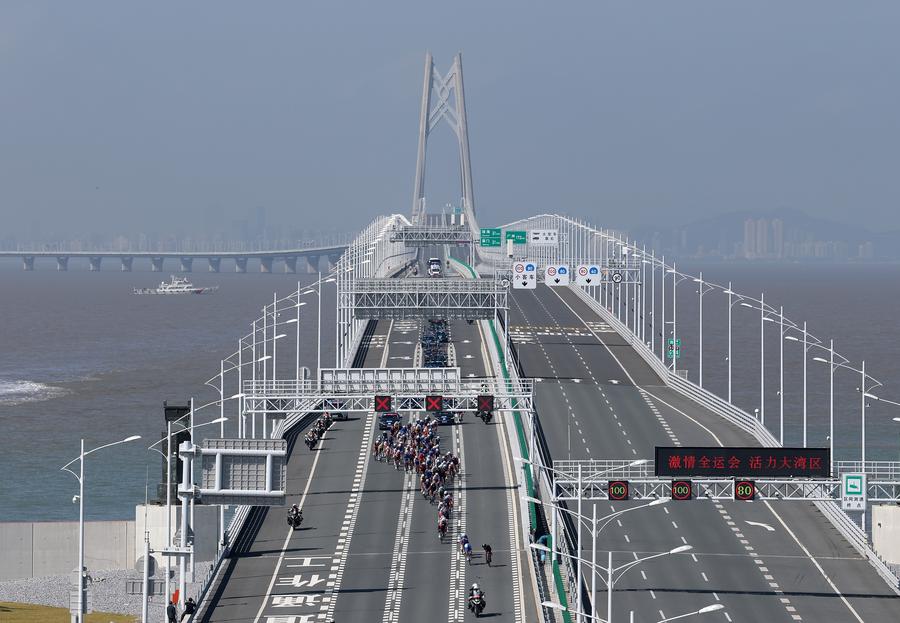
Athletes compete across the Hong Kong-Zhuhai-Macao Bridge during the men's road race of cycling road at China's 15th National Games in south China's Guangdong Province, Nov. 8, 2025. (Xinhua/Liang Xu)
In a historic first for China's National Games, the men's individual road cycling race connected Guangdong, Hong Kong and Macao in a single 231.8-kilometer route on Saturday, symbolizing unprecedented regional cooperation.
In an unprecedented feat of regional coordination, the men's individual road cycling race of China's 15th National Games concluded with a bang on Saturday.
The 231.8-kilometer race didn't just test athletes - it seamlessly traversed the three host regions of Guangdong, Hong Kong and Macao along a route featuring the iconic Hong Kong-Zhuhai-Macao Bridge. It marked the first-ever cross-boundary competition in the Games' 66-year history.
"The successful completion of this seemingly impossible mission relied on the joint efforts of the three regions," said Pun Weng Kun, director of the Macao Competition Area Preparatory Office for the Games.
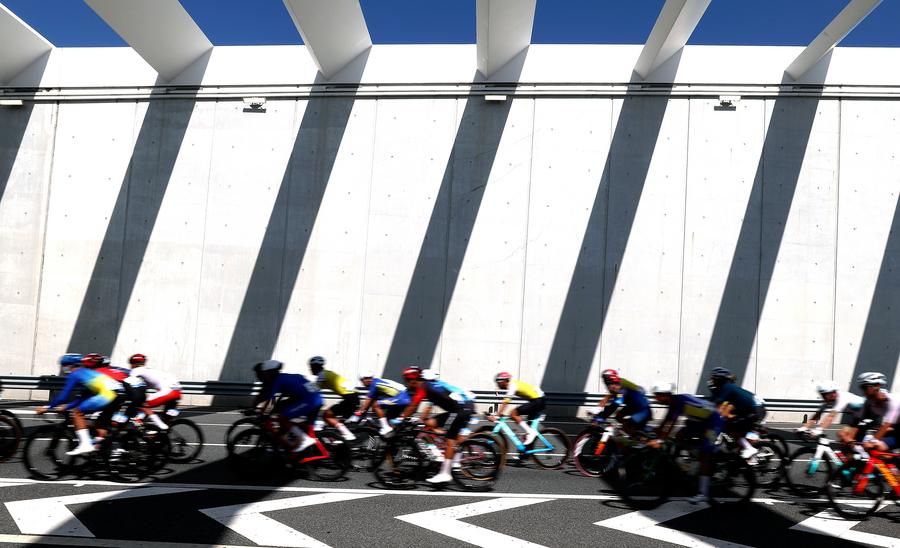
Cyclists compete during the men's road race of cycling road at China's 15th National Games in south China's Guangdong Province, Nov. 8, 2025. (Xinhua/Mao siqian)
"Sports serve as the best universal language, enabling collaboration under common rules. By allowing sports to take the lead as a pilot, the 15th National Games has paved the way for future cooperation in other fields within the Guangdong-Hong Kong-Macao Greater Bay Area," Pun added.
Under the "one country, two systems" framework, Hong Kong and Macao maintain their own legal systems and customs territories.
For many involved, holding a cross-boundary event seemed initially impossible.
"The idea was brilliant, but to be honest, I truly didn't believe this could be accomplished when we started," admitted Feng Yuyu, one of the first three staff members from the Zhuhai Committee involved in the project.

Athletes compete during the men's road race of cycling road at China's 15th National Games in Hong Kong, south China, Nov. 8, 2025. (Xinhua/Lui Sui Wai)
The journey began in early 2023 when sports authorities started exploring which event could genuinely connect the three regions. Road cycling emerged as the optimal choice over marathon and sailing after extensive analysis.
"The distance for road cycling is flexible. It could be 200 km, 240 km, or longer. The lighting and ventilation in the tunnels also meet requirements," said Han Feng, deputy secretary-general of the Chinese Cycling Association. "For such a historic race, we would certainly recommend our event."
What followed was over a year of intensive route planning involving the cycling association and the three regions. "We must have drawn dozens, even hundreds of route versions," recalled Yuan Xiong, deputy director of the Zhuhai Competition Area Committee Office, noting that minimizing disruption to residents' lives remained a constant consideration throughout the process.
For Pao Hin Fong, a staff member of the Macao Sports Bureau who served as Macao's liaison officer, the two-year preparation was filled with both anticipation and concern.
"For us as organizers, the safety of the athletes is the number one priority," Pao shared. "So when I thought about that at the start, you could say I was both excited and worried."
The collaboration spanned more than 20 specialized WeChat groups connecting departments from the three regions, covering areas from border control and customs to radio communications.
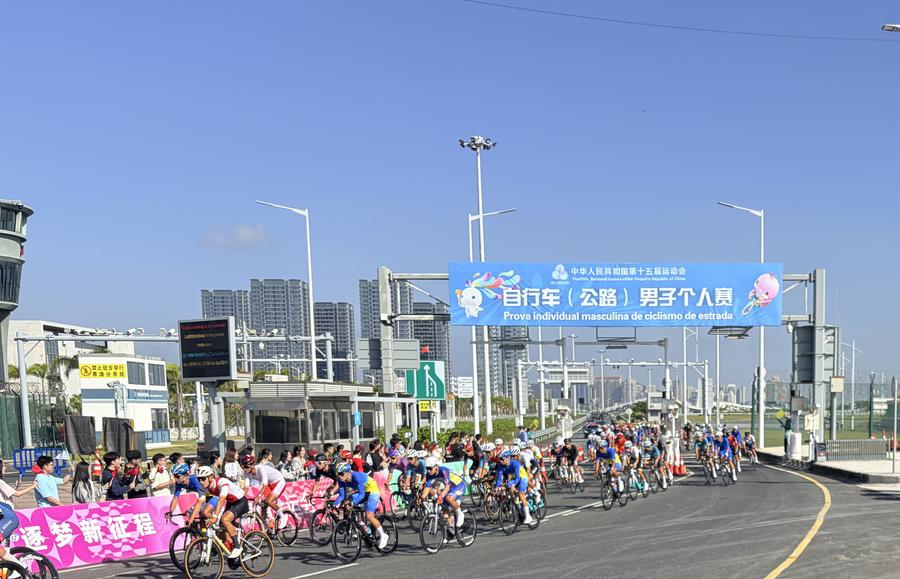
Cyclists compete during the men's road race of cycling road at China's 15th National Games in Macao, south China, Nov. 8, 2025. (Photo by Song Xi/Xinhua)
"The atmosphere was actually very good," Pao recalled of the cross-regional coordination. "We researched and discussed together. For some of the more difficult issues, we would find the core problem, then each return to our own regions to find the corresponding government departments to discuss how to solve it."
The true challenge of this race wasn't the distance, but the dotted lines on a map.
"Without the Hong Kong-Zhuhai-Macao Bridge, there would be no conditions to connect the three places through a single race," said Yuan.
The event's most formidable logistical challenge was the six times the peloton crossed jurisdictional boundaries.
For a high-speed cycling race where any pause could be decisive, a traditional stop-and-check customs process was impossible. The solution was an innovative "pre-inspection and closed-loop management" model.
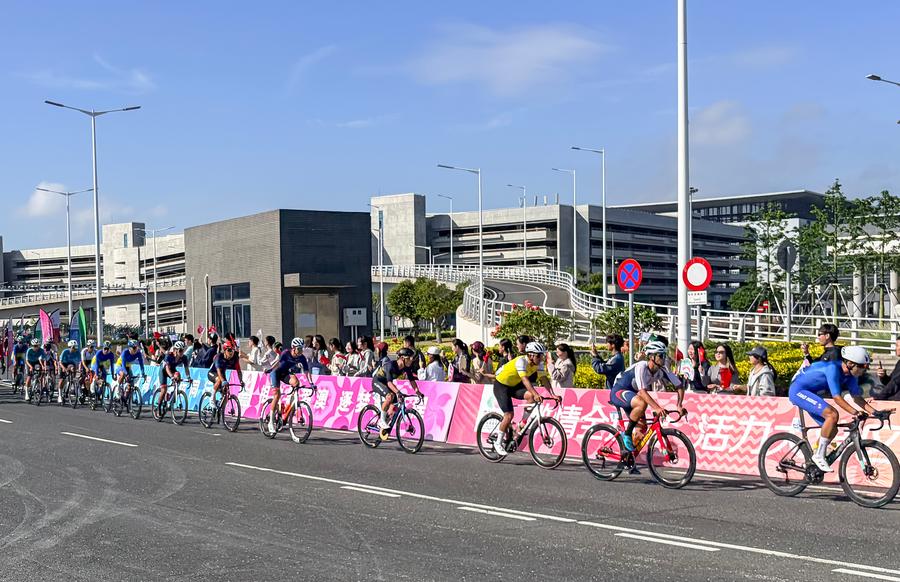
Cyclists compete during the men's road race of cycling road at China's 15th National Games in Macao, south China, Nov. 8, 2025. (Photo by Song Xi/Xinhua)
"We adopted a method of 'pre-inspection + backend data comparison'," explained Min Yuntong, executive deputy director of the Zhuhai Committee.
Athletes and support personnel were pre-registered into a "white list." As they crossed the boundaries between Guangdong, Hong Kong and Macao, they passed under a gantry equipped with Radio-Frequency Identification (RFID) technology.
"The system automatically completes verification as athletes cross the boundaries, ensuring both speed and information accuracy," Min said. This integration of existing technologies achieved what organizers dubbed "zero delay, zero contact and zero wait" clearance.

Cyclists compete during the men's road race of cycling road at China's 15th National Games in south China's Guangdong Province, Nov. 8, 2025. (Xinhua/Lian Zhen)
The breakthrough was as much about mechanism as technology. For the first time, customs and border inspection set up a joint pre-inspection zone at the race's start and finish area outside the Zhuhai Museum.
"With the strong support of the General Administration of Customs, we moved the regulatory time and space to here," said Wang Peiyang, deputy director of the Hong Kong-Zhuhai-Macao Bridge Customs. "Hong Kong and Macao customs also sent officers to participate in the pre-inspection process as observers."
On race morning, 103 athletes with their bicycles and a total of 257 personnel and 68 support vehicles were processed through this system.
The centerpiece of the route, the Hong Kong-Zhuhai-Macao Bridge, was also the segment with the highest meteorological risk. Dong Juan, deputy director of the Zhuhai Meteorological Bureau, detailed that the bridge spans the Pearl River Estuary, situated right at a terrain where wind is easily amplified.
"In November, the probability of Level 7 winds on the bridge can reach 18.5 percent," Dong explained, adding that such crosswinds pose a significant danger to cyclists.
To mitigate this, the meteorological departments of the three regions built a high-precision monitoring network with a total of 52 automatic weather stations being deployed along the entire route, averaging one every two to three kilometers.
For the first time, two high-precision wind-profiling lidars were installed on the Artificial Island and the White Dolphin Island of the bridge, filling a critical monitoring gap over the sea.
"The three meteorological departments started to conduct joint weather consultations daily since a week ago, and have co-developed a dedicated meteorological support system," Dong said. This system provided real-time data on temperature, wind speed and direction, feeding directly into the event's command center.
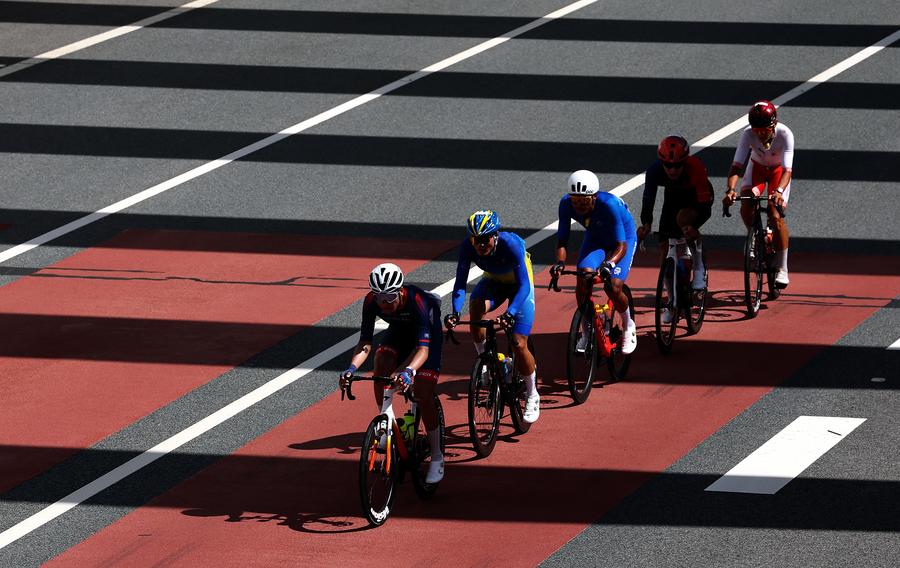
Cyclists compete during the men's road race of cycling road at China's 15th National Games in south China's Guangdong Province, Nov. 8, 2025. (Xinhua/Liang Xu)
The weather on race day was sunny and mild. Dong's team worked until 2 a.m. on race day and were back monitoring at 4 a.m.. "Only when we saw the sunrise glow in the east did everyone breathe a sigh of relief," she said.
While technology provided the tools, it was the dedicated collaboration of countless individuals across the three regions that turned an ambitious concept into reality.
When the peloton finally crossed from Zhuhai into Macao on race morning, the emotional payoff was profound. "I was quite moved," Pao said. "That was quite a touching moment for me."
For all involved, the sleepless nights before the race gave way to overwhelming relief and satisfaction as the final rider crossed the finish line. "The process was quite difficult," Yuan said. "But what nobody has done before is the most challenging, and the most meaningful."
















